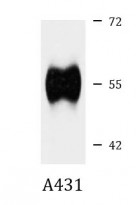ARG58879
anti-B4GALT1 antibody
anti-B4GALT1 antibody for Western blot and Human
Overview
| Product Description | Rabbit Polyclonal antibody recognizes B4GALT1 |
|---|---|
| Tested Reactivity | Hu |
| Tested Application | WB |
| Host | Rabbit |
| Clonality | Polyclonal |
| Isotype | IgG |
| Target Name | B4GALT1 |
| Antigen Species | Human |
| Immunogen | Recombinant fusion protein corresponding to aa. 50-215 of Human B4GALT1 (NP_001488.2). |
| Conjugation | Un-conjugated |
| Alternate Names | beta4Gal-T1; GTB; EC 2.4.1.38; Beta-1,4-GalTase 1; Beta4Gal-T1; Nal synthase; EC 2.4.1.22; Beta-1,4-galactosyltransferase 1; EC 2.4.1.-; B4GAL-T1; EC 2.4.1.90; GT1; b4Gal-T1; CDG2D; UDP-Gal:beta-GlcNAc beta-1,4-galactosyltransferase 1; GGTB2; UDP-galactose:beta-N-acetylglucosamine beta-1,4-galactosyltransferase 1 |
Application Instructions
| Application Suggestion |
|
||||
|---|---|---|---|---|---|
| Application Note | * The dilutions indicate recommended starting dilutions and the optimal dilutions or concentrations should be determined by the scientist. | ||||
| Positive Control | A431 | ||||
| Observed Size | 55 kDa |
Properties
| Form | Liquid |
|---|---|
| Purification | Affinity purified. |
| Buffer | PBS (pH 7.3), 0.02% Sodium azide and 50% Glycerol. |
| Preservative | 0.02% Sodium azide |
| Stabilizer | 50% Glycerol |
| Storage Instruction | For continuous use, store undiluted antibody at 2-8°C for up to a week. For long-term storage, aliquot and store at -20°C. Storage in frost free freezers is not recommended. Avoid repeated freeze/thaw cycles. Suggest spin the vial prior to opening. The antibody solution should be gently mixed before use. |
| Note | For laboratory research only, not for drug, diagnostic or other use. |
Bioinformation
| Database Links | |
|---|---|
| Gene Symbol | B4GALT1 |
| Gene Full Name | UDP-Gal:betaGlcNAc beta 1,4- galactosyltransferase, polypeptide 1 |
| Background | This gene is one of seven beta-1,4-galactosyltransferase (beta4GalT) genes. They encode type II membrane-bound glycoproteins that appear to have exclusive specificity for the donor substrate UDP-galactose; all transfer galactose in a beta1,4 linkage to similar acceptor sugars: GlcNAc, Glc, and Xyl. Each beta4GalT has a distinct function in the biosynthesis of different glycoconjugates and saccharide structures. As type II membrane proteins, they have an N-terminal hydrophobic signal sequence that directs the protein to the Golgi apparatus and which then remains uncleaved to function as a transmembrane anchor. By sequence similarity, the beta4GalTs form four groups: beta4GalT1 and beta4GalT2, beta4GalT3 and beta4GalT4, beta4GalT5 and beta4GalT6, and beta4GalT7. This gene is unique among the beta4GalT genes because it encodes an enzyme that participates both in glycoconjugate and lactose biosynthesis. For the first activity, the enzyme adds galactose to N-acetylglucosamine residues that are either monosaccharides or the nonreducing ends of glycoprotein carbohydrate chains. The second activity is restricted to lactating mammary tissues where the enzyme forms a heterodimer with alpha-lactalbumin to catalyze UDP-galactose + D-glucose <=> UDP + lactose. The two enzymatic forms result from alternate transcription initiation sites and post-translational processing. Two transcripts, which differ only at the 5' end, with approximate lengths of 4.1 kb and 3.9 kb encode the same protein. The longer transcript encodes the type II membrane-bound, trans-Golgi resident protein involved in glycoconjugate biosynthesis. The shorter transcript encodes a protein which is cleaved to form the soluble lactose synthase. [provided by RefSeq, Jul 2008] |
| Function | The Golgi complex form catalyzes the production of lactose in the lactating mammary gland and could also be responsible for the synthesis of complex-type N-linked oligosaccharides in many glycoproteins as well as the carbohydrate moieties of glycolipids. The cell surface form functions as a recognition molecule during a variety of cell to cell and cell to matrix interactions, as those occurring during development and egg fertilization, by binding to specific oligosaccharide ligands on opposing cells or in the extracellular matrix. [UniProt] |
| Cellular Localization | Golgi apparatus, Golgi stack membrane, Single-pass type II membrane protein, Cell membrane, Cell surface, Cell projection, filopodium, Golgi apparatus, Secreted. [UniProt] |
| Calculated MW | 44 kDa |
| PTM | The soluble form derives from the membrane forms by proteolytic processing. [UniProt] |
Images (1) Click the Picture to Zoom In






